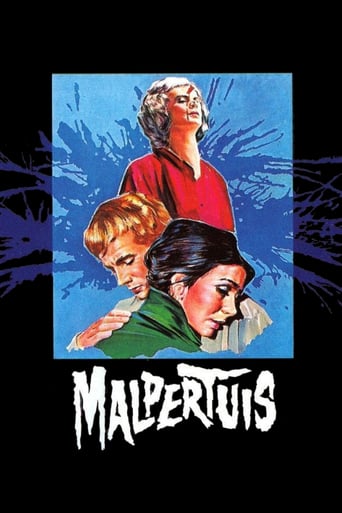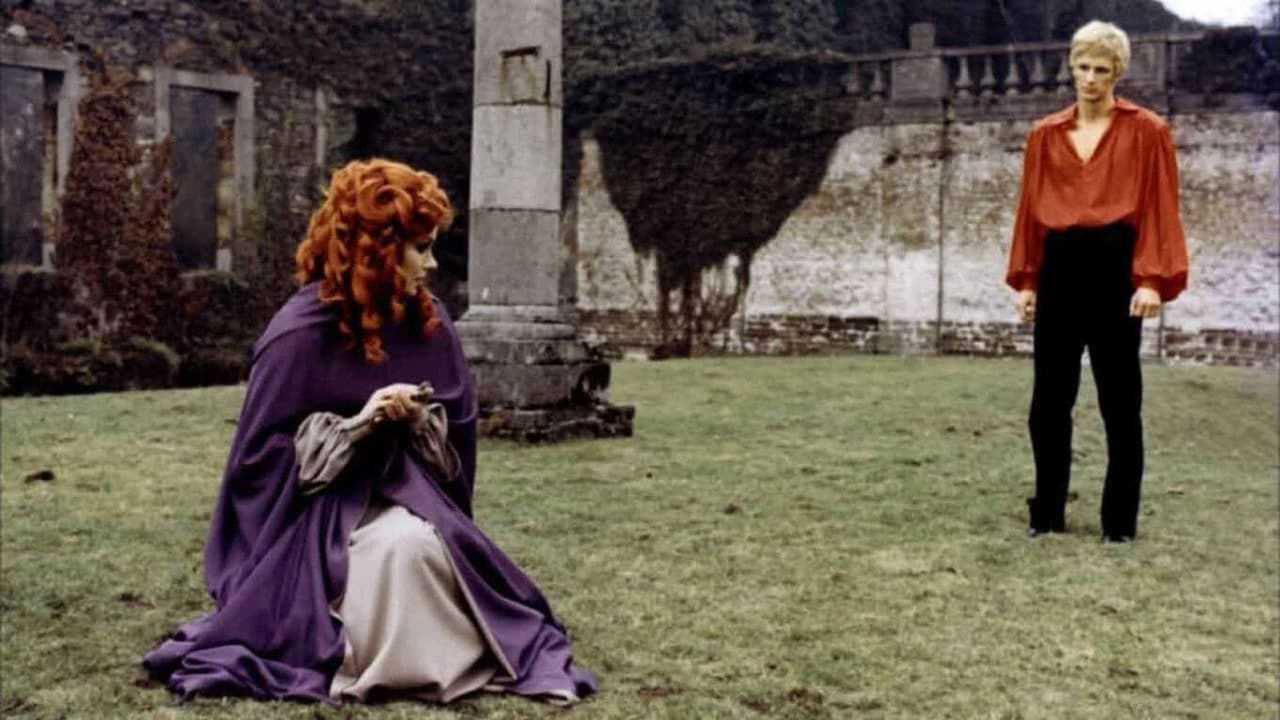Witchfinder General 666
Before seeing "Malpertuis" (1971), I was already a fan of Belgian director Harry Kümel for his mesmerizing Lesbian Vampire film "Les Lèvres Rouges" (Daughters of Darkness) from the same year, which, in my opinion, is the best film of its kind. I had great expectations for "Malpertuis", because of my admiration of Kümel as a true master of atmosphere, because I had heard the film was Kümel's greatest, and because of Orson Welles stared in it. Even so, this instant favorite of mine surpassed my greatest hopes and totally blew me away. "Malpertuis" is a bizarre and hypnotic mixture of surreal Gothic Horror, macabre family Drama, mad science and Mythological Fantasy, that no cineaste should allow himself (or herself) to miss. Actually, I'd like to correct myself. The film cannot really be narrowed down by attributing it to a particular Genre as such, as it is simply one of the most unique films ever made. In one sentence: The film has everything, and more than that. "Malpertuis" tells one of the most fascinating stories ever brought to screen, and does so in a brilliantly moody manner. The film maintains an incomparably rich, eerie and foreboding atmosphere that becomes more intense with each passing minute. The sublime atmosphere comes along with breathtaking settings, brilliant cinematography, complex and demented characters and fantastic acting performances. The most fascinating thing about "Malpertuis", however, is the story, which is one of the most incomparable and gripping I ever saw in a film. "Malpertuis" is not a film that can properly compared to anything else. It is like a macabre, haunting yet incredibly beautiful Fever Dream.The film is an adaptation of a novel by Jean Ray, which I haven't yet read. I sure intend to, though, as the plot of "Malpertuis" is one of the most unique and fascinating stories that have ever been filmed. Great praise therefore also belongs to writer Jean Ferry. Jan (Mathieu Carrière), a young sailor, comes to his hometown and, without wanting to, visits the family mansion owned by his creepy and mysterious uncle Cassavius (Orson Welles). The mansion is named Malpertuis, its inhabitants are (equally creepy) relatives who hate Cassavius, but do everything to brown-nose him in desire of his inheritance. A mysterious palace of a mansion, bears fascinating and terrifying secrets... Though this is only a vague description of the film, I shall stop at this point. I do not want to give too much away, as the story is gripping and fascinating from the very beginning and should be experienced rather than read in a review. The sceneries are some of the greatest, most awe-inspiring I have ever seen. The house Malpertuis alone is one of the most fascinating settings ever in cinema. The atmosphere is overwhelming, rich and uncanny throughout the film. Each character is fascinating, most of them creepy and demented, the performances are sublime. Orson Welles is, of course, great as always, an I would personally even consider "Malpertuis" one of the greatest films this brilliant actor has been part of in his awe-inspiring career. The other performances are also magnificent. Mathieu Carriere is great as Jan, and other actors, such as Jean-Piere Cassel, Victor Rilla, Michel Bouquet and particularly Charles Jenssen are also brilliant in their roles. Particular praise has to go to the stunningly beautiful Susan Hampshire, who is wonderful in her triple role, playing three different female leads. The rich atmosphere profits from the Flamish (Dutch) language and an ingenious score. The film was once reportedly cut to shreds, watching the uncut 126 minute director's cut is absolutely essential. "Malpertuis" is a film that simply cannot be praised enough. This ingenious and absolutely unique masterpiece is one of the most fascinating cinematic experiences one can have, both atmospherically and story-wise, and must not be missed by anybody interested in cinema. As said above: It has everything, and a lot more. 10/10
pppatty
Having seen this film some years ago on television in a dark, dubbed and cut print, I had all but forgotten it. Yesterday I saw Kumel's restored cut in his own Flemish language, running 124 minutes, and my reaction was "brilliant". The picture was actually originally made in English, French, German and Dutch versions and then hacked to bits in the various markets. This film is a "must-see" for any serious film fan with its fabulous photography, stylish composition and surreal overtones - Magritte too was Belgian. It's more than a horror film as it has often been tagged, but a series of dreams or perhaps nightmares with all the illogic of dreams. I am fairly certain that Welles did his own Flemish dialog and that too makes it a must for the connoisseur.
dbdumonteil
That's what the title means;or at least,that's what the priest explains to Matthieu Carrière.The subtitle is overkill and was added for commercial reasons,probably unbeknownst to the director."Doomed house" is a stupid title:are we so sure it's the story of a house? Isn't it rather the story of a mind? of a fantasy? of a folly?This poesque subtitle is not suitable for Jean Ray's world,who keeps a certain logic inside a nightmarish swarming of monsters,werewolves,Gorgons and mad scientists.Some of his obsessions surface here:the Gorgon,turning mortals into stone,the taxidermist working on alive bodies,are topics we find not only in "Malpertuis" but also in "the adventures of Harry Dickson" ,his favorite hero (he wrote dozens of stories of this detective and his pupil Tom wills)Prometheus recalls here how suffering and sadism were haunting the Belgian writer.Because Belgian,this definitely is.Kummel's closest relative is none other than his compatriot André Delvaux who quoted Jean Ray in his masterwork "un soir,un train".I urge the users who have liked "Malpertuis" to try "Un soir ,un train".It's the same kind of atmosphere,simply it's more mastered,the emotional power -cruelly lacking in Kummel's work- is increased tenfold ."Malpertuis" has a dream of a cast:Orson Welles-in a short part,but he makes every of his word count-,Matthieu Carrière ,"Der Junge Törless" wunderkind,Susan Hampshire,Two Chabrol favorites (Michel Bouquet and Jean-Pierre Cassel,both in "la rupture" some months before),and,most amazing thing,French singer Sylvie Vartan and in a cameo(uncredited) her then-husband ,Johnny Hallyday.The plot may be hard to swallow for horror buffs.It's a film "à tiroirs",and the ending has in store at least three unexpected twists.The last picture leaves the spectator bewildered.Hampshire and Carrière seem unreal,and the world that surrounds them is no longer a world in ruins,but a world that forgot he's in ruins.And what kind of world is it?
awalter1
Based on the novel by Jean Ray (the so-called "Belgian Poe"), "Malpertuis" begins with Jan, a young sailor, being summoned with a motley company of acquaintances and family to the death bed of his mysterious Uncle Cassave. Cassave soon dies, leaving his considerable fortune to the dozen or so people he has summoned. However, there are stiff terms attached to his gift: The inheritors must all live for the rest of their lives at Malpertuis, Cassave's mansion. Jan soon realizes there is something amiss at Malpertuis (a name meaning either "house of evil" or "house of cunning"). There is something odd in the attic, in the labyrinthine hallways, and in the surrounding wood. There is something even stranger about Malpertuis' other inhabitants: the mad hermit Lampernisse who haunts the mansion's dark corridors, the coy and beautiful Euryale who will not look anyone in the face, and the diabolic taxidermist Philarete, to name only a few. When the secret of Malpertuis is finally brought to light among this bizarre cast of characters, the mansion erupts into a seething cauldron of terror, and both heaven and earth seem to collapse around Jan.While fans of Jean Ray's novel will find the story much changed, the film is visually engaging at the very least, and the casting is excellent, for the most part. Orson Welles plays the dying Uncle Cassave, delivering the second performance of his career as a large man stuck in a very large bed (the other performance being, of course, in his adaptation of Kafka's "The Trial"). Susan Hampshire gives an admirable performance in four different roles--excellently well disguised and made-over in each--as Euryale, Nancy, Alice, and a nurse. The sets are extraordinary, filling the screen with an unending stream of vivid detail. Also, the film's cinematography is often both aggressive and intelligently creative, employing just the sort of unpredictable perspective necessary to portray the mansion's mystifying interior.Disappointments with the film begin small. Jean-Pierre Cassel as Lampernisse does not look the part. Instead of a tall, shadowy, aged-but-ageless, and profoundly mad hermit, he looks like a leper who has wandered off the set of "Ben-Hur." Accompanying Lampernisse is the laughable, high-pitched babble of the "creatures in the attic." In these rare instances, the filmmakers miss by a wide margin the texture of Ray's novel. At other times the film slightly underplays or rushes some of the book's strongest scenes. The one serious offense, though, is the film's ending; the muddled chaos here is a poor substitute for Ray's synchronized anarchy.This is not to say that the film loses itself completely. The strength of the first hour and more cannot be entirely undermined by the ending. The inspired cinematography and many of the sets, performances, and special effects are truly exceptional. The scenes with little, crazed, mousy Philarete and his morbid workroom are reason enough for the film to exist. Subtlety and humor are here as well, perhaps best represented in the recurring static shot of the inheritors occupying themselves in Malpertuis' small drawing room.


 AD
AD



